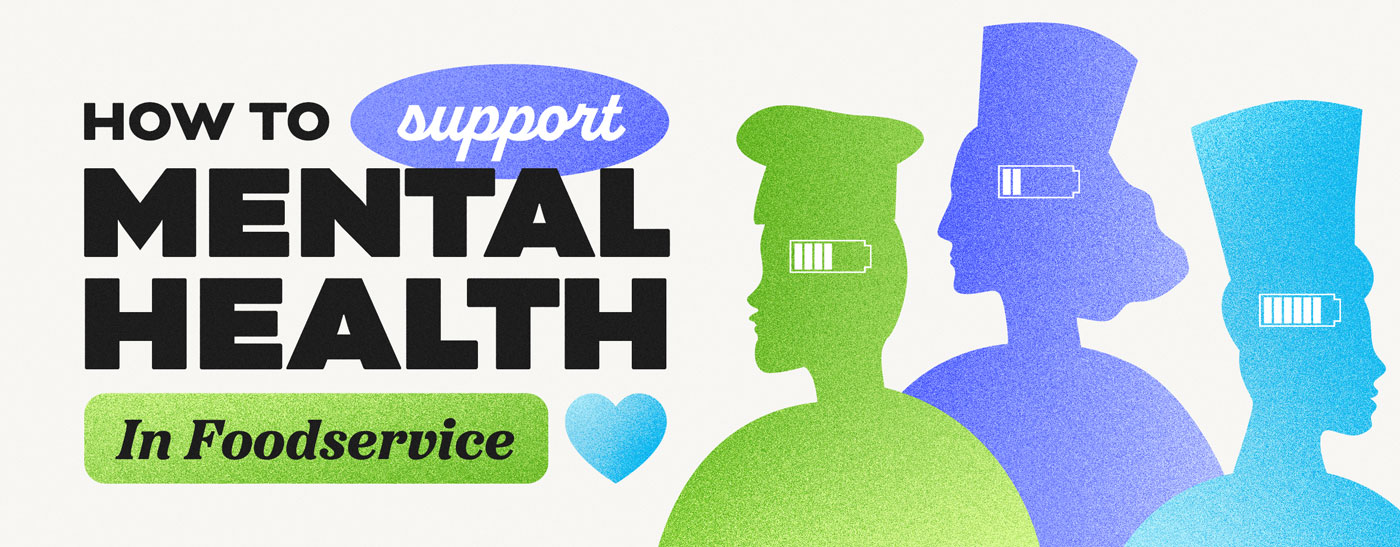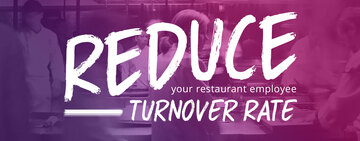
Prioritizing Mental Health in the Restaurant Industry
Last updated on Aug 25, 2025From cultivating memorable dining experiences for our birthdays and anniversaries to offering warm smiles and easy laughs while we unwind with coworkers during happy hour, foodservice workers help us celebrate milestones, alleviate stress, and savor the rich flavors of life. Creating these experiences comes at great personal sacrifice. The restaurant industry is a notoriously high-stress work environment with demanding, inconvenient schedules.
Sadly, society has embraced and even glamorized the often toxic culture of restaurant work. Hollywood TV shows give us realistic depictions that say, "this is how it is, and it is what it is". But here at WebstaurantStore, we dare to dream past "how it is" to how it should be. Foodservice managers have a responsibility to rewrite the narrative of restaurant culture. We've created a guide to the current state of the industry and how we can help change it.
- Identify Signs of Emotional Distress
- Create a Safe Space for Employees
- Implement an Open-Door Policy
- Apply Staff Feedback for Continuous Improvement
- Set up an EAP
- Reimburse Mental Health Services
- Conduct Mental Health Workshops and Training
- Promote Mindful Positive Reinforcements and Reflection Moments
- Provide Mental Health Resources
Understanding Mental Health in the Restaurant Industry
While the camaraderie, high energy, socialization, and opportunity to serve others inherent in restaurant work can be extremely rewarding, aspiring chefs should go in with both eyes open. Restaurant staff are often going non-stop, feeding others without the chance to pause long enough to feed themselves. The late-night and weekend work schedule makes maintaining friendships and regular exercise challenging.
Social circles often narrow to those within your restaurant. As the only things open at 2 a.m., the main opportunities for recreation and release are hitting bars after long shifts, leading to a heavy drinking culture. Combine these factors, and it's no wonder that mental health statistics for restaurant workers show some less-than-favorable data.
- 60% of chefs surveyed by Unilever Food Solutions in 2023 believe their work negatively affects mental well-being.
- 70% of chefs who responded to a 2023 Cozymeal survey reported experiencing anxiety from working in restaurants.
- 60% of upscale restaurant servers have at least one mental health problem, such as depression or anxiety, according to a National Center for Biotechnology Information study conducted in 2021.
- 1 in 3 chefs surveyed by Unilever Food Solutions experienced verbal harassment within their workplace.
- Self-medication and unhealthy stress relievers are prevalent; 53% of surveyed chefs smoke, 46% drink alcohol, and 26% take illicit drugs.
- When taking the national averages, the hospitality and restaurant industry reports the third highest rate of heavy alcohol use at 11.8%, the highest rate of illicit drug use at 19.1%, and the highest rate of substance abuse disorder at 16.9%.
- 10.3% of food industry workers suffer from clinical depression.
- The foodservice industry falls within the 13th to 19th positions for the highest number of suicides by occupation. Additionally, it ranks second in terms of suicidal ideation, with 5.7% of workers contemplating taking their own lives within the past year.
How to Support Restaurant Staff's Mental Health

While no one can (or should) take full responsibility for another's mental health, foodservice managers can take practical steps to cultivate healthy workplaces. From policies and procedures to resources and support services, learn how you can support your staff's mental health.
1. Identify Signs of Emotional Distress
Recognizing signs of emotional distress in employees is crucial for maintaining a healthy work environment in the restaurant industry. While these signs may be due to a variety of external factors, awareness of the following indicators allows restaurant managers to take proactive steps in supporting their staff members' mental well-being. If you are a hospitality business owner, consider having your managers take the QPR Institute's Suicide Prevention Training Course.
- Changes in Behavior: Increased irritability or mood swings. Withdrawal from social interactions. Decreased productivity or motivation. Excessive absenteeism or tardiness.
- Physical Symptoms: Unexplained aches and pains. Changes in appetite or weight. Fatigue or difficulty sleeping. Increased use of alcohol or drugs.
- Emotional Responses: Persistent feelings of sadness or hopelessness. Anxiety or panic attacks. Anger or outbursts of frustration. Overwhelming feelings of stress or burnout.
- Relationship Dynamics: Difficulty working with coworkers or customers. Conflict or tension in workplace interactions. Isolation from team members. Strained personal relationships outside of work.
- Performance Issues: Decline in the quality of work. Inability to meet deadlines or complete tasks. Lack of focus or concentration. Poor decision-making and judgment.
- Enforce Harassment Policies: While your staff may deal with harassment and difficulties from guests, they should not have to endure it from their fellow employees. Establish clear and strict harassment policies and ensure all employees know what constitutes harassment and the consequences for such behavior.
- Transparency in Decisions and Policies: Maintain open communication channels and be transparent about decision-making processes and policies to build trust and foster a sense of fairness among employees.
- Respectful Interactions: Encourage respectful interactions among staff members by promoting empathy, active listening, and understanding in all workplace interactions.
- Inclusive Language: Use inclusive language that respects individuals of all backgrounds, cultures, and identities to create a welcoming, equitable environment. Respect individuals' gender identities and preferences by using pronouns in all communications and interactions.
- Teach and Encourage Restaurant Spanish: Offering training programs to teach restaurant Spanish to employees bridges language barriers and improves communication with Spanish-speaking colleagues and customers.
- Gender Neutral Facilities: Provide gender-neutral facilities to accommodate the diverse needs of employees and customers, creating a more inclusive environment for all.
- Acknowledge and Celebrate Differences: Recognize and celebrate the diverse backgrounds, experiences, and perspectives of employees to foster a culture of acceptance and appreciation for individual differences.
- Encouraging Staff to Share Concerns and Seek Help: Communicate to your team that it is not only acceptable but encouraged to speak up about any issues they may be facing. Encourage open dialogue and assure employees that seeking help for mental health concerns is a sign of strength, not weakness.
- Ensuring Confidentiality and Respect for Employee Privacy: Emphasize the importance of confidentiality and respect for employee privacy when discussing sensitive matters. Make it clear that any information shared will be kept confidential unless there is a risk of harm to the individual or others.
- Implementing a Confidential Feedback Box: Provide a confidential feedback box where employees can submit their concerns or suggestions anonymously. This can offer a safe outlet for staff who may be hesitant to speak up in person.
- Taking Personal Interest in Your Employees' Lives: Show genuine care and concern for your employees by taking a personal interest in their lives. Get to know them on a deeper level and ask follow-up questions about major events or changes. This demonstrates that you value them as individuals and not just as employees.
- Ensure Staff Get Adequate Breaks: Provide designated break times throughout shifts and ensure they're respected. Allot an area in the restaurant as a distraction-free, quiet zone where employees can relax and recharge away from the bustling front and back of house.
- Provide Staff Meals: Offering staff meals fosters a sense of community and camaraderie. Sitting down together to enjoy a meal can create a positive atmosphere and give employees a chance to relax and recharge.
- Implement Post-Shift Reflection Activities: Provide positive feedback on what your staff did well after each shift and encourage them to give shoutouts to their team members. Do gratitude exercises where staff share something they are grateful for to put focus on positivity and create a supportive atmosphere.
- Team Building Exercises: Engaging in team building exercises that focus on boosting mental health can be a fun and effective way to promote a positive work environment. Consider organizing active activities such as group workouts or outdoor team challenges that encourage physical activity and teamwork. Alternatively, you can plan activities that involve giving back to the community, such as volunteering at a local charity or organizing a fundraising event.
- Allow Staff to Take a Community Service Day on Their Birthday: Allowing your staff to take a community service day on their birthday can be a meaningful way to promote mental well-being and encourage a sense of purpose. Allowing employees to spend their special day giving back to others can be a rewarding experience that fosters a sense of fulfillment and connection.
- Choose Gifts and Rewards Thoughtfully: When recognizing and rewarding your staff, choose gifts and incentives that align with promoting mental health. Avoid gifts that revolve around alcohol or drinking, as these may not be suitable for all team members. Instead, consider thoughtful rewards such as wellness products, gift cards for self-care services, or experiences that promote relaxation and mindfulness.
- Suicide and Crisis Lifeline: The Suicide and Crisis Lifeline is a national network of local crisis centers that provides free and confidential emotional support to individuals in suicidal crisis or emotional distress. By calling 988, individuals can speak with trained crisis counselors who can offer support, resources, and referrals to local mental health services. They also have text, chat, and deaf/HOH options.
- Culinary Hospitality Outreach Wellness (CHOW): Culinary Hospitality Outreach Wellness (CHOW) is a non-profit organization dedicated to supporting the mental health and wellness of individuals working in the restaurant industry. CHOW offers counseling services, support groups, and educational workshops to help restaurant workers navigate mental health challenges.
- Behind You (SSF): Behind You is a program run by the Southern Smoke Foundation (SSF) that provides mental health support to hospitality industry professionals. Through Behind You, restaurant workers can access free mental health services, including therapy sessions and crisis intervention resources.
- Substance Use Recovery Initiative: The Substance Use Recovery Initiative is a program that offers support and resources to individuals in the restaurant industry who are struggling with substance use issues. They provide access to addiction treatment programs, support groups, and counseling services to help individuals on their journey to recovery. Any food service worker who undergoes inpatient treatment for substance use is eligible to apply for financial assistance from Giving Kitchen.
- Ben's Friends: Ben's Friends is a support group for individuals in the hospitality industry who are struggling with substance abuse or addiction. This peer-led group provides a safe space for restaurant workers to share their experiences, receive support, and connect with others who understand the unique challenges they face via daily Zoom meetings.
2. Create a Safe Space for Employees
As a manager, you can't eliminate the fast-paced and high-pressure nature of foodservice, but you can cultivate a culture of open communication and support. By implementing certain practices, businesses can become safe spaces where individuals feel respected, valued, and supported. Here are some key strategies for being a safe space business:
3. Implement an Open-Door Policy

By fostering an environment where staff feel comfortable sharing their concerns and seeking help, you can create a supportive workplace culture that promotes well-being. Make yourself available and approachable to your staff and equip them to share their feedback through the following strategies:
4. Apply Staff Feedback for Continuous Improvement
By actively seeking feedback from your staff, you can gain valuable insights into their experiences and challenges. But information gathering isn't enough; you must take action to address issues. When you make changes based on feedback, it builds confidence in you as a manager and makes your staff feel supported, ultimately helping you retain your best employees.
Specifically seek and apply feedback on ways to relieve physical strain on your staff. This can be achieved through automation to streamline repetitive tasks or by updating your dress code to provide more comfortable and practical uniforms. By prioritizing physical well-being, you can help reduce the risk of injuries and alleviate unnecessary stress on your team members.
5. Set up an EAP
Employee Assistance Programs (EAPs) are employer-sponsored programs that provide employees with confidential counseling and support services to address personal or work-related issues affecting their well-being. The first step in setting up an EAP in a restaurant is to research EAP providers and select one that aligns with your specific needs and budget. Choose a provider that offers a range of services, including counseling, crisis intervention, and referrals to mental health professionals.
Once a provider is selected, communicate the availability of the EAP to all employees through employee handbooks, posters in the workplace, and informational sessions. Emphasize the confidentiality of the program to encourage employees to seek help without fear of judgment or repercussions. Managers play a critical role in creating a supportive work environment and ensuring that employees feel comfortable seeking help when needed, so train managers and supervisors on how to recognize signs of mental health issues and how to refer employees to the EAP.
6. Reimburse Mental Health Services
Restaurant workers' schedules make using mental health services challenging, so you can remove barriers by providing access. Since mental and physical health are interrelated, consider offering gym membership reimbursements. Regular exercise can reduce stress, improve mood, and boost overall well-being. Researchers at the University of California, Los Angeles discovered that, typically, an individual experiences an average of 3.4 days of poor mental health each month. However, for individuals who engage in regular exercise, the occurrence of poor mental health days decreased by over 40 percent.
Therapy can provide individuals with tools to manage stress, improve coping skills, and address mental health concerns. However, therapy is expensive and may feel unattainable to your staff. By subsidizing therapy costs, restaurants show that they value their employees' mental well-being and are committed to helping them access the support they need. How many sessions should you reimburse? As a general rule of thumb, Employee Assistance Programs typically provide a range of 3 to 8 complimentary therapy sessions per specific concern annually.
7. Conduct Mental Health Workshops and Training

While you can create a supportive workplace environment and offer access to resources, ultimately, each individual must choose to prioritize their mental health. However, people are often too overwhelmed or lack the training to identify their struggle until it has overtaken them. By bringing mental health workshops and training programs directly to their employees, restaurant owners can equip staff to take charge of their mental health.
These mental health workshops can cover a range of topics, including stress management, anxiety reduction techniques, and self-care practices. Techniques such as mindfulness, meditation, deep breathing exercises, and time management skills can all reduce stress levels and improve overall well-being. By equipping staff with the knowledge and skills to identify and address mental health issues, restaurant owners can create a positive workplace culture that values mental health.
8. Promote Mindful Positive Reinforcements and Reflection Moments
Part of creating a healthy workplace environment is easing stress in the workflow and building a healthy team culture. From the team building exercises you choose to the rewards you give your staff, you should be considering their mental health. By incorporating the following strategies into their restaurant culture, restaurant owners and managers can help their staff manage stress, improve focus, and boost overall job satisfaction.
9. Provide Mental Health Resources
While the environment you create and the internal resources you provide are vital to your staff's well-being, additional professional assistance is both available and necessary. Make this list of mental health resources readily available to your employees.
You can't create a culture; you are the culture. As a restaurant owner or manager, you set the tone for your workplace. The future of the foodservice industry isn't defined by the culture you inherited; it's defined by the culture you carry within you.





